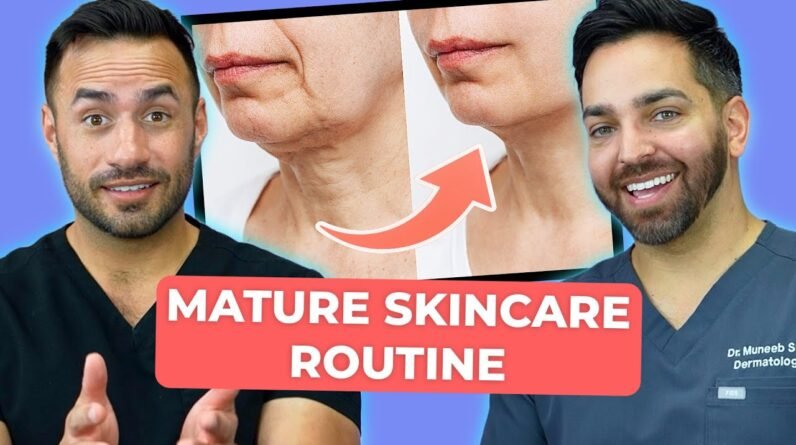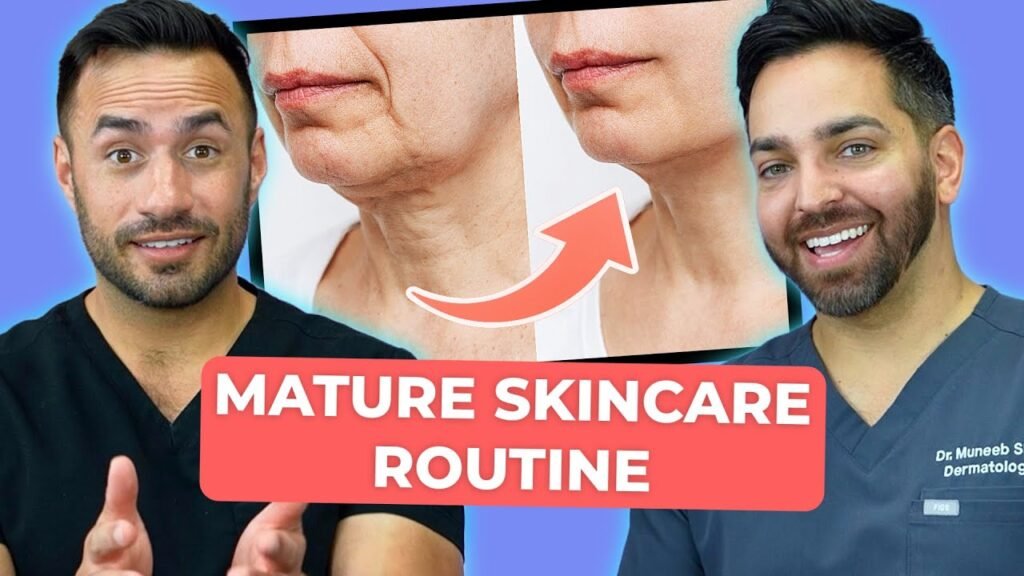
Hey there! Welcome back to our channel, where we discuss all things skincare and dermatology. Today, we’re tackling a highly requested topic: mature skin and how to care for it as we age. As we get older, our skin undergoes various changes, including decreased cell turnover, decreased oil production, and changes in nutrient exchange. Additionally, hormonal changes, like estrogen deficiency during menopause, can greatly impact the appearance of our skin. But don’t worry, we’ve got you covered with the ultimate skincare routine for those in their 40s, 50s, 60s, and beyond! We’ll be discussing the importance of cleansers, retinoids, exfoliation, peptides, moisturizers, vitamin C, and sunscreen in your skincare routine. So stick around, because we’ll be sharing all the tips and tricks you need to keep your skin looking its best.

Understanding Skin Changes in Aging
As we age, our skin undergoes various physiological changes that can affect its appearance and health. These changes include decreased cell turnover, decreased oil production, and changes in nutrient exchange. These changes can lead to dull-looking skin, dryness, and a decrease in collagen and elastin. Additionally, hormonal changes, such as estrogen deficiency during menopause, can further impact the appearance of the skin. Deeper changes, such as fat pad migration and bone absorption, also occur with aging. It’s important to understand these skin changes in order to develop an effective skincare routine for mature skin.
Effect of Hormonal Changes on Skin
Hormonal changes, particularly estrogen deficiency during menopause, can have a significant impact on the appearance of the skin. Estrogen plays a crucial role in maintaining the health and vitality of the skin. When estrogen levels decrease, the skin may become thinner, drier, and more prone to wrinkles. It may also lose its natural glow and elasticity. Hormonal changes can also lead to an increase in pigmentation, known as melasma. Understanding the effect of hormonal changes on the skin is important in order to address these specific concerns in a skincare routine.
In-depth Skin Changes like Fat Pad Migration and Bone Absorption
In addition to the surface-level changes in the skin, there are also deeper changes that occur with aging. Fat pad migration refers to the downward movement of the fat pads in the face, leading to sagging and a loss of volume. This can contribute to the formation of wrinkles and a hollowed appearance. Bone absorption is another change that occurs with age, where the bones of the face lose density. This can further contribute to facial sagging and a loss of facial structure. Understanding these in-depth skin changes is essential in developing a comprehensive skincare routine that addresses all aspects of skin aging.
Components of a Mature Skincare Routine
A mature skincare routine for people in their 40s, 50s, 60s, and beyond should include several key components. These components are cleansing, treating with active ingredients, moisturizing, and protecting with sunscreen. Cleansing is an essential first step in any skincare routine. It helps remove dirt, oil, and impurities from the skin, preparing it for the other steps. Treating with active ingredients, such as retinoids and peptides, helps target specific skin concerns like wrinkles and loss of elasticity. Moisturizing is crucial for hydrating and nourishing dry and aging skin. Finally, protecting the skin with sunscreen helps prevent further damage from harmful UV rays.
The Importance of Cleansing in Skincare
Cleansing is a vital step in any skincare routine, and it becomes even more important as we age. Choosing the right cleansers for aging skin is key. Hydrating and gentle cleansers are best suited for mature skin, as they clean the skin without stripping away its natural oils. These cleansers help maintain the skin’s hydration and moisture barrier, which can become compromised with age. Proper cleansing also plays a role in preparing the skin for other skincare products, allowing them to penetrate more effectively.
The Role of Retinoids in Skincare
Retinoids are a type of vitamin A derivative that has been extensively studied for their beneficial effects on the skin. They have been shown to improve collagen and elastin production, increase cell turnover, and thicken the skin. These effects can help reduce the appearance of wrinkles, improve skin texture, and enhance overall skin health. Incorporating retinoids into a skincare routine is especially important for mature skin, as they can address many of the common skin concerns associated with aging.
Benefits of Skin Exfoliation in Your 40s, 50s, 60s
Exfoliation becomes increasingly important as we age. The natural process of skin cell turnover slows down with age, leading to a buildup of dead skin cells on the surface. This can result in a dull complexion, uneven skin texture, and a decrease in the skin’s ability to absorb and benefit from other skincare products. Regular exfoliation helps remove these dead skin cells, stimulating cell turnover and revealing fresh, radiant skin. It can also help address concerns such as rough texture, hyperpigmentation, and fine lines.
Peptides and Their Effect on Skin Health
Peptides are short chains of amino acids that play a crucial role in various biological processes, including skin health. In skincare, peptides like Matrixyl 3000 and acetyl hexapeptide-8 are commonly used for their anti-aging properties. Matrixyl 3000 has been shown to decrease wrinkles, increase collagen production, and improve skin thickness. Acetyl hexapeptide-8, also known as “Botox in a jar,” helps relax facial muscles and reduce the appearance of fine lines and wrinkles. Incorporating peptide-based products into a skincare routine can complement and enhance the anti-aging effects of other skincare ingredients.
Importance of Moisturizing in Skincare
Moisturizing is a crucial step in any skincare routine, particularly for dry and aging skin. As we age, the skin’s natural ability to retain moisture decreases, leading to dryness, flakiness, and a decrease in skin elasticity. Moisturizers help restore hydration to the skin and strengthen the skin’s natural moisture barrier. Look for moisturizers that contain ceramides, which are lipids that help lock in moisture and protect the skin from external stressors. Regular moisturization can improve the overall appearance and texture of the skin, leaving it soft, supple, and plump.
Benefits of Vitamin C in Skincare
Vitamin C is a powerful antioxidant that offers numerous benefits for mature skin. It helps protect the skin from free radical damage caused by environmental stressors, such as UV radiation and pollution. Vitamin C also promotes collagen synthesis, which improves skin elasticity and reduces the appearance of wrinkles. Additionally, it can help brighten the complexion, fade dark spots and hyperpigmentation, and even out skin tone. Incorporating vitamin C and other antioxidants into a skincare routine can help maintain the overall health and vitality of the skin.
Sunscreen: A Crucial Part of Skincare
Sunscreen is a crucial step in any skincare routine, regardless of age. It plays a vital role in protecting the skin from further damage caused by harmful UV rays. Chronic sun exposure is one of the leading causes of premature skin aging, including wrinkles, age spots, and loss of elasticity. Applying sunscreen with at least SPF 30 on a daily basis can help prevent these signs of aging and maintain the overall health of the skin. Look for broad-spectrum sunscreens that protect against both UVA and UVB rays for optimal protection.
Conclusion: Maintaining Skin Health As You Age
In conclusion, maintaining optimal skin health as you age requires a comprehensive skincare routine that addresses the specific concerns of mature skin. Understanding the physiological changes in the skin, the role of hormonal changes, and the in-depth skin changes like fat pad migration and bone absorption is crucial in developing an effective skincare routine. Building an ultimate skincare routine for mature skin involves cleansing, treating with active ingredients like retinoids and peptides, moisturizing, and protecting with sunscreen. Following these steps and incorporating targeted skincare products can help maintain the health, appearance, and vitality of your skin as you age.






